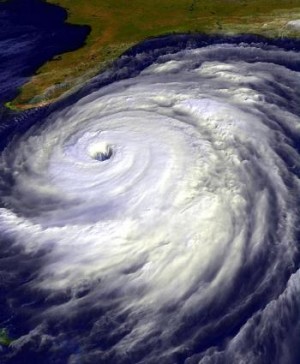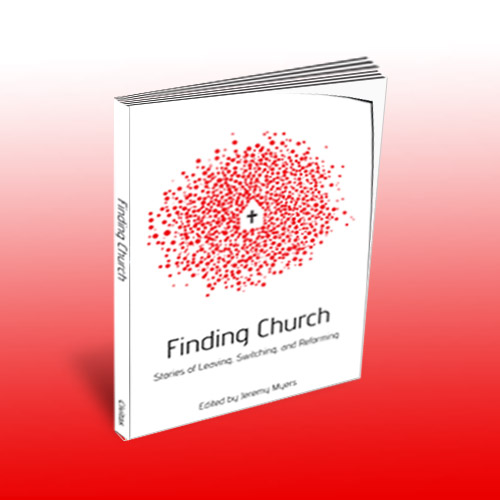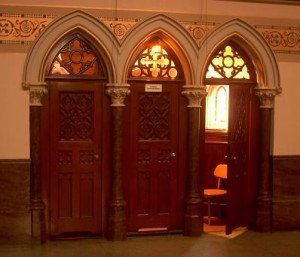This post is based on the Grace Commentary on Jonah. Make sure you sign up for the email newsletter to get a free digital copy of this commentary when it is released.
 In light of the recent storms in various parts of the world and considering some of the storms and natural disasters of the past, it is sometimes asked whether or not God sends these storms, or if they are simply “natural” disasters.
In light of the recent storms in various parts of the world and considering some of the storms and natural disasters of the past, it is sometimes asked whether or not God sends these storms, or if they are simply “natural” disasters.
Some Christians have come out to say that such disasters are God’s judgment upon a nation, a city, or a people for their evil. It is easy to see how these Christians come to such a conclusion, especially when the Bible has several examples of storms and famines sent by God to judge people for their disobedience. God sent fire and brimstone upon Sodom and Gomorrah, the Ten Plagues upon Egypt, and a storm on the ship carrying Jonah.
So it is reasonable to ask whether God sends storms and natural disasters today.
There are four basic answers:
- No, and God never has. The Bible is wrong. God allows these storms, but never sends them.
- No, though God did do this in the past in biblical times, He doesn’t do this any longer.
- Yes, God is in control of everything, and so all storms and weather patterns are a result of His perfect will.
- Yes, God can send storms, but He usually doesn’t, and there is no way to be certain today which storms are divinely sent and which ones are just a result of natural weather patterns. However, God can use all storms to call people back to Himself.
I reject option 1 because I do not believe the Bible contains errors. The Bible says that God sent various storms in Biblical times, and I am not comfortable saying that the Bible is wrong.
I reject option 2 because I do not believe that the character of God changes, and if He sent storms in the past, but does not do so any longer, it would seem that the only reason is because He had a change in His character. I cannot accept that.
I also reject option 3 because to me, it is theologically repugnant. I cannot accept the idea that God sends all storms, hurricanes, tornadoes, famines, earthquakes, tsunamis, and a host of other disasters which kill thousands of people, causes terrible destruction, and leads to massive sickness and sadness.
But if I reject option 3, it seems that I must also reject option 4. If it is not theologically acceptable to say that God sends all storms, isn’t it just as unacceptable to say that God sends some? I mean, most storms cause devastation, death, and destruction, so if God sends some storms, isn’t He causing some of these things?




 In 1850, Alfred Lord Tennyson wrote a poem called “In Memorium A.H.H” in which he said that man:
In 1850, Alfred Lord Tennyson wrote a poem called “In Memorium A.H.H” in which he said that man:
 Paul, in his letter to the Corinthians in the Christian New Testament, says that we now see through a glass darkly. Is that merely a figure of speech, or does it, as I have always wondered, imply that what lies on the other side of that glass is not far away.
Paul, in his letter to the Corinthians in the Christian New Testament, says that we now see through a glass darkly. Is that merely a figure of speech, or does it, as I have always wondered, imply that what lies on the other side of that glass is not far away.


 Note: This Giveaway has ended, but make sure you
Note: This Giveaway has ended, but make sure you 
 The practice of confessing sins to a priest is not explicitly commanded anywhere in Scripture, though it is derived from various passages. For example,
The practice of confessing sins to a priest is not explicitly commanded anywhere in Scripture, though it is derived from various passages. For example, 
 After visiting numerous churches in the town to which I had recently moved I decided that the employees at Home Depot were much friendlier than are the people in the churches I’d visited. Most people
After visiting numerous churches in the town to which I had recently moved I decided that the employees at Home Depot were much friendlier than are the people in the churches I’d visited. Most people 

 Similarly, Lucy, in C.S. Lewis’
Similarly, Lucy, in C.S. Lewis’  If we consider the possibility that Narnia is an actual physical place that somehow exists in another physical dimension, perhaps in a “parallel universe”, then the “doorway” to Narnia must be an actual doorway of some sort. However, how would one “cross over” into another dimension, even if it is an actual physical place, using an actual physical doorway that one might find in this dimension?
If we consider the possibility that Narnia is an actual physical place that somehow exists in another physical dimension, perhaps in a “parallel universe”, then the “doorway” to Narnia must be an actual doorway of some sort. However, how would one “cross over” into another dimension, even if it is an actual physical place, using an actual physical doorway that one might find in this dimension?
 I just don’t understand this church stuff. Several times in the past few months I’ve gone to a church I found in the phone book. The first time I went, five people asked me my name and where I live. Two days later, a nice couple showed up at my door with a plate of cookies. The pastor even sent me a letter that said he was glad I had visited. Everything looked very promising.
I just don’t understand this church stuff. Several times in the past few months I’ve gone to a church I found in the phone book. The first time I went, five people asked me my name and where I live. Two days later, a nice couple showed up at my door with a plate of cookies. The pastor even sent me a letter that said he was glad I had visited. Everything looked very promising.